2024 Cohort Reflects on First Year of APS Editorial Fellowship
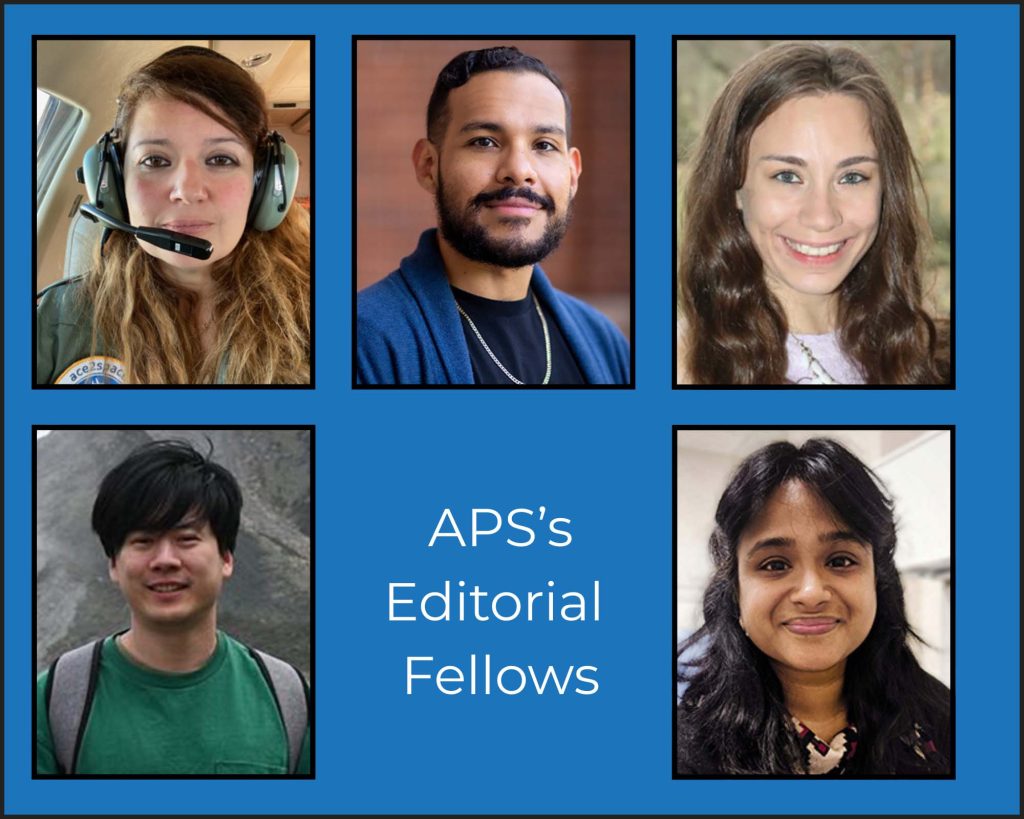
Image above: APS Editorial Fellows, clockwise from top left: Leyla Loued-Khenissi, Ivan Carbajal, Chelsea Boccagno, Aishwarya Rajesh, Kongmeng Liew.
Ivan Carbajal • Leyla Loued-Khenissi • Chelsea Boccagno • Kongmeng Liew • Aishwarya Rajesh
The first cohort of editorial fellows joined APS in April 2024, bringing their rich array of experiences and backgrounds to the program.
APS launched the program to help scientists develop their skills as editors, with a goal of creating and sustaining a pipeline of journal editors that represent modern psychological science. Two fellows were assigned to each of three APS journals: Psychological Science, Clinical Psychological Science, and Advances in Methods and Practices in Psychological Science. Each fellow was paired with an editor mentor at the journal, who provided guidance on any of the editorial tasks for the manuscripts assigned to the fellow.
Fellows completed tasks typically required of an associate editor, including initial evaluations of submitted manuscripts, selecting and inviting reviewers to evaluate the manuscripts, synthesizing reviews, and writing decision letters.
APS spoke with fellows from the 2024 cohort to hear about their experiences and gather advice for future fellows. Read their thoughts below.
Psychological Science
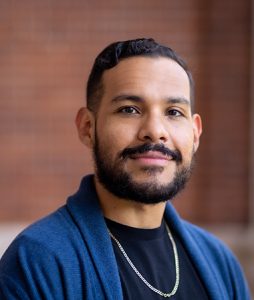
Ivan Carbajal
Oregon State University
Carbajal’s research interests focus on the impact of bilingualism and biculturalism on executive functioning among Latinx individuals. He is focused on developing a range of methodological and culturally sensitive research approaches involving understudied populations.
What has been the most rewarding aspect of your editorial fellowship this year? And what were some unexpected challenges you faced in this role?
One of the most rewarding aspects of the editorial fellowship was the opportunity to engage in monthly discussions with three of the editors-in-chief for APS journals—Simine Vazire, Jennifer Tackett, and David Sbarra—as well as the other fellows. These conversations allowed us to dive into important topics such as ethics, power, and the vital responsibility that editors carry in ensuring a thorough peer-review process. I really appreciated hearing from both the experts and my peers about various situations and how we can move ahead in the most ethical manner. One of my favorite parts of the editorial process was looking for experts that I thought would be great to review a paper. The most unexpected challenge was asking for and securing reviewers for manuscripts. I understand this isn’t just an issue for APS journals; it appears to be a common challenge in the peer-review process, and I should not take it personally if someone says no.
What have you learned about the peer-review process that you didn’t know before?
I discovered that there’s so much more to editing manuscripts than meets the eye. It’s truly enlightening to understand what it really takes to get something published, and the nuances of what can and can’t be done for authors, reviewers, and editors alike. I also realized just how vital an editor’s role is in the publication process. For a time, I found myself grappling with the realization that this position comes with a significant amount of responsibility—much like Spiderman, it’s essential to wield this power wisely! I really appreciate my mentor, Derek Isaacowitz, for welcoming me to get involved with manuscripts early on and for always being there to answer my questions and provide guidance on the decisions I needed to make (and for giving me his view on the power/responsibility piece).
What skills and knowledge have you gained that you will take forward in your career?
One of the most valuable lessons I’ve learned and will keep embracing is the importance of being kind to the editors who work on my manuscripts and being patient throughout the entire process. One interesting takeaway for me is learning to think like an editor. I reflect on how I would approach my work if I were in that role, considering what aspects might need more development. I also think about who might review it and what specific things they would look for in the manuscript, which makes my work better.
Has your perspective on academic publishing changed over the past year?
Definitely! For me, the academic publishing side was such an enigma. I didn’t know what needed to happen to have something published and the work that went in to make sure work got reviewed. The most illuminating piece was how hard it was to find reviewers at times, and this was something many of the other editorial fellows mentioned, too. This makes me think of two things in general: having patience with publishing and that the peer-review system will need a change in the future.
Has this experience influenced how you approach your own writing and submissions?
Absolutely! As I mentioned a little earlier, my experience with the journal Psychological Science has really encouraged me to reflect on what makes a manuscript both efficient and high-quality. I also see the value of open science in the publishing world more clearly now, and it feels so important!
What advice do you have for future editorial fellows with APS journals?
Be patient, enjoy the peer-review selection, and start early! Oh, and build a relationship with your mentor.
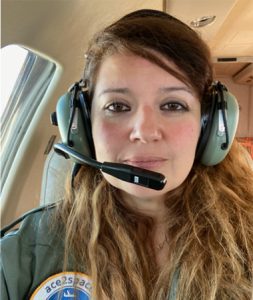
Leyla Loued-Khenissi
Lausanne University Hospital
Loued-Khenissi is a cognitive neuroscientist focusing on predictive coding models in brain and behavior. Her expertise includes neuroimaging design, computational models, and statistical methods.
What has been the most rewarding aspect of your editorial fellowship this year? And what were some unexpected challenges you faced in this role?
The best part of this fellowship was working with and learning from researchers who are dedicated to edifying the editorial process in psychological research. The experience did a lot to restore my faith in the editorial process overall, witnessing firsthand the methodical care with which the team addressed submissions. The toughest challenge was balancing fairness with my personal sense of what makes a paper compelling. That judgment remains, in my view, highly qualitative and subjective.
What have you learned about the peer-review process that you didn’t know before?
I’ve learned that the peer-review process is largely driven by goodwill and a genuine effort to improve scientific work. Given the justified criticism of both the review process and empirical practices in psychology, I began the fellowship with some cynicism. But I saw that editors and reviewers take their responsibility seriously and with humility—constantly questioning their own judgments and debating decisions to refine the process. The process still isn’t perfect, but I now have greater confidence in the collective effort to get it right.
What skills and knowledge have you gained that you will take forward in your career?
It’s been incredibly valuable and useful to be part of the behind-the-scenes work that goes into the editorial process because I’ve gained a better understanding of what is evaluated, what is required, et cetera—not just to get published, but to adequately craft a reliable and useful scientific work. Of course, we think we know coming in, and we do, to a degree. Being on the other side has expanded my understanding of those requirements with the result that I’ve sharpened my critical view towards my own work.
How has your perspective on academic publishing changed over the past year? Has this experience influenced how you approach your own writing and submissions?
I have more confidence in the peer-review process overall, though I still recognize its imperfections. Being on the editorial side has erased some of the “us versus them” mentality that authors often feel, even if we all call each other peers. This experience has also changed how I approach my own submissions—I now pay closer attention to specific methodological details that will make my work more transparent and robust from the outset.
What advice do you have for future editorial fellows with APS journals?
I highly recommend this experience to anyone curious about the editorial process. My main advice is to observe and absorb as much as possible in the first few months—but don’t be afraid to contribute your perspective. You were selected for a reason. I hesitated to voice my opinions early on but, in hindsight, I wish I had been more confident. I advise future fellows to trust their insights to engage more freely once they understand the journal’s mission and expectations.
Clinical Psychological Science
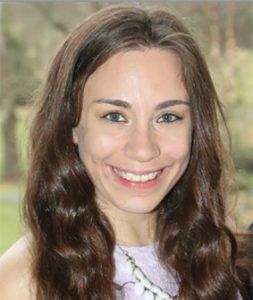
Chelsea Boccagno
Harvard T. H. Chan School of Public Health
Massachusetts General Hospital
Boccagno uses causal inference methods on data sets from observational studies, ecological momentary assessment, and randomized control trials to identify the most effective treatment strategies for suicide prevention. She also conducts behavioral studies and leverages social media data to examine how sense of self influences the ability to regulate emotions in clinical populations.
What has been the most rewarding aspect of your editorial fellowship this year? And what were some unexpected challenges you faced in this role?
It’s a tie for me! The two most rewarding aspects of my fellowship have been getting to experience the editorial process from start to finish (from receiving the manuscript, through synthesizing reviews, to writing decision letters) and having authentic and enriching monthly Zoom chats with the editors-in-chief and additional editorial fellows about the peer-review process and psychological science more broadly (e.g., the pros and cons of peer review, techniques to reduce bias in peer review, existing barriers to inclusion in psychological science).
One unexpected challenge I had as a fellow was finding peer reviewers who would accept the invitation to review a manuscript. Psychological science is currently experiencing a reviewer shortage and, even for prestigious journals, I learned it could take quite a while to find three suitable peer reviewers who accept the invitation to review. So having a list of potential reviewers at the onset is helpful. Another challenge was reconciling mixed reviews (e.g., if one reviewer recommended a revise-and-resubmit and another reviewer recommended a rejection). Synthesizing multiple perspectives and making an executive decision from this synthesized perspective can be a hard process but is also a deeply valuable and enjoyable aspect of academic publishing.
What have you learned about the peer-review process that you didn’t know before?
Throughout the APS fellowship, I gained deeper insights into each stage of the peer-review process. For example, I have a better understanding of how associate editors tend to decide on whether a manuscript will be a desk rejection. If associate editors believe the paper would look vastly different after revisions, such that the revised paper would likely have a completely new conceptual framework or methodological approach, the manuscript is more likely to be a desk rejection. Similarly, I learned more about additional manuscript decisions, such as the difference between a revise-and-resubmit with “moderate” versus “extensive” revisions. I also learned about how journal priorities and stipulations can change over time. APS journals, for example, now strongly recommend submitting manuscripts with preregistered projects. This recommendation reflects the APS staff’s efforts to enhance transparency, increase accuracy, and reduce bias in psychological science.
What skills and knowledge have you gained that you will take forward in your career?
My experiences in the fellowship have shaped how I approach my research, my peer reviews, and my scientific communication. I’m now able to evaluate research manuscripts from the perspective of not only an author or peer reviewer, but also an associate editor. Honing this perspective has allowed me to evaluate my own manuscripts, and other researchers’ manuscripts, with greater clarity and precision. Additionally, through selecting suitable reviewers and reconciling differing perspectives, I learned how to provide more comprehensive and balanced feedback to authors, which I think will make me a stronger writer, mentor, peer reviewer, and associate editor moving forward. I also feel more confident in my ability to detect and remedy ethical dilemmas that can emerge in the peer-review process, including conflicts of interest.
How has your perspective on academic publishing changed over the past year? Has this experience influenced how you approach your own writing and submissions?
Throughout the past year, I gained a renewed optimism for academic publishing. Of course, academic publishing has its shortcomings, and these shortcomings are hard to remedy. However, I now know that editorial teams for psychology journals tend to be deeply passionate about identifying solutions for long-standing difficulties in our field. Witnessing the solution-oriented mindset among the editors-in-chief strengthened my belief that the psychology researchers who take on these positions are dedicated to improving the peer-review process. The editorial staff members more broadly (e.g., senior managers of publications) also work tirelessly to ensure the publication process is prompt and thorough. Overall, I’m now more inspired to continue submitting my manuscripts to academic journals. I want to prioritize submitting my work to journals that show a dedication to improving our field and the publication process (e.g., as indicated by the journal’s mission statement or the editorial board’s stated goals for improvement in the publishing process).
What advice do you have for future editorial fellows with APS journals?
This editorial fellowship provides a super-cool opportunity to not only learn more about the editorial process but also engage in thought-provoking chats about how to strengthen our field. The editorial team members across the APS journals are passionate, action-oriented, eager to strengthen the peer-review process, and flexible about what topics we discuss in the monthly meetings. Feel free to send to the team any information you come across that you think would be interesting to chat about (e.g., articles, blog posts, a summary of new editorial practices happening in other psychology journals)—this content could become the focus of a future meeting. Also, feel free to ask any questions that are on your mind about peer review. The editorial team is very responsive and has great insights based on their extensive experiences.
Finally, try to be as patient with yourself as you can when it comes to the multi-stage editorial process—especially if you’re new to being an associate editor! Each component is its own challenging, rewarding, and important step to the finish line for the manuscript in your hands. Jotting down your reflections along the way is a good way to retain what you learn. And you’re not alone in the process—remember that you can turn to your mentor and team for help with any aspect.
Relevant webinar: Professional Development: Demystifying Peer Review
Advances in Methods and Practices in Psychological Science
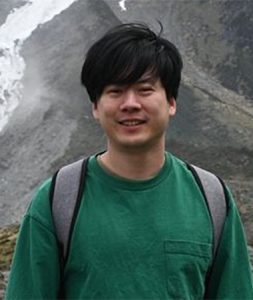
Kongmeng Liew
University of Canterbury
Liew applies computational methods to the study of culture and human psychology and has conducted his research within the Asia–Pacific region. Liew mines social media data, video-game statistics, streaming services, and other data sources and utilizes machine-learning approaches.
What has been the most rewarding aspect of your editorial fellowship this year? And what were some unexpected challenges you faced in this role?
For me, the most rewarding aspect of the fellowship has to be, by far, Dave Sbarra’s mentorship. Being able to hear his thoughts on every aspect of the peer-review and publishing process was already very informative but having him guide me through my own editorial decisions was the icing on the cake. This certainly helped for the challenges. I didn’t realize editing would be so difficult; for example, when faced with manuscripts that I didn’t know should go out for review or be rejected, or when I had problems with getting feedback from reviewers, or when consolidating contrasting reviews to come to an editorial decision, Dave was always there to provide reliable advice and was tremendously helpful.
What have you learned about the peer-review process that you didn’t know before?
I think I didn’t quite understand the responsibility that editors have in the peer-review process. From choosing appropriate reviewers to deciding on publication or rejection, the small decisions that are made along the way could snowball into defining the journals and, by extension, influencing where psychology as a discipline could be heading next. It’s a huge responsibility and there’s no mistaking the importance of being fair, empathic, and as unbiased as possible when handling these decisions.
What skills and knowledge have you gained that you will take forward in your career?
Aside from a much more thorough understanding of the peer-review process, I learned the importance of considering the potential impact and readership of any paper. Though it’s always important to maintain scientific rigor at a high level and to write in a way that is simple, clear, and effective, I hadn’t realized the importance of considering who the target readers of the paper should be. Is this paper meant to be for a broad, general audience of peers? Or perhaps it’s meant for a narrower audience of experts in a niche subject area. These have to be written very differently, and that’s something that I really came to appreciate during the fellowship.
How has your perspective on academic publishing changed over the past year? Has this experience influenced how you approach your own writing and submissions?
Related to the previous point, the notion of what makes a good paper is different from what makes a good paper that is appropriate for the journal you want to submit to. In the fellowship, I’ve seen good, methodologically strong papers get rejected (and often desk-rejected) simply for not being a good fit with the journal’s intended readership. This has helped me with improving my own writing and also with selecting more appropriate journals for my research.
What advice do you have for future editorial fellows with APS journals?
Ask questions. This fellowship brings together some of the best minds in psychology today, and their combined years of wisdom are a fantastic resource to any early-career researcher who may be just starting out on their journey in academia. Some of the most engaging and memorable discussions I’ve witnessed in this program were sparked by simple questions asked by my fellow fellows, so I’d highly recommend coming into the program with a curious and open mind.
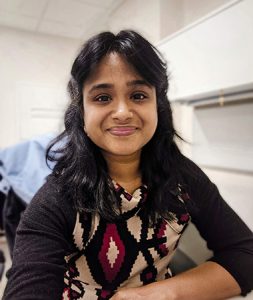
Aishwarya Rajesh
Washington University in St. Louis
Rajesh studies the intersection of stress, mood, and brain injury, with the aim of fostering treatment protocols and intervention models that reduce the risk of clinical psychological disorders. Her research identifies individual differences in brain morphology and their association with cognitive abilities and co-occurring biopsychosocial symptoms in traumatic brain injury.
What has been the most rewarding aspect of your editorial fellowship this year? And what were some unexpected challenges you faced in this role?
I have come to deeply appreciate the crucial role of the editorial process in scientific publishing. It was eye-opening to see how editors make pivotal decisions about a paper’s suitability for a journal, especially during the post-review phase. This aspect of the role vividly demonstrated how editors can drive scientific progress forward, providing me with a tangible experience of contributing actively to the advancement of science. One of the most daunting challenges was making the “right” decisions on papers that fell slightly outside my primary field of expertise, particularly when weighing the often-opposing perspectives of diverse reviewers. These experiences have significantly enriched my understanding of the editorial landscape and underscored the delicate balance required to honor and advance scientific work.
What skills and knowledge have you gained that you will take forward in your career?
My role has underscored the importance of clarity and accessibility in presenting scientific material. I now make deliberate efforts to enhance these aspects in my writing. My approach to coding has evolved significantly. I now place a greater emphasis on thorough documentation and extensive commenting, which are essential for making code usable and replicable by others. Additionally, this role has refined my ability to critically engage with research papers. I now delve deeper into the authors’ intentions, scrutinize the presentation and accuracy of figures, and proactively try to anticipate/consider alternative perspectives/analyses. My interaction with papers has become more curiosity-driven, rather than merely satisfying a restless “need to know.”
Engaging in discussions with peers has been transformative, helping me to achieve a more balanced and objective perspective. This has been crucial in checking my assumptions, recognizing potential biases, and clarifying any points of confusion. Moving forward, I am committed to maintaining open lines of scientific communication and fostering an environment where such discussions can thrive and influence further research.
What have you learned about the peer-review process that you didn’t know before?
One of the key insights I’ve gained from my editorial fellowship is the complexity of the decision-making process in peer review. This includes selecting appropriate reviewers and determining the course of action after receiving their feedback—whether to resend the paper for further review, use the same reviewers, or weigh their comments against the paper’s suitability for the journal. I also learned about the critical role editors play in balancing differing reviewer opinions and integrating their own evaluations to provide constructive feedback. Moreover, witnessing the transformation of a paper from its initial submission to its final published form was enlightening.
How has your perspective on academic publishing changed over the past year? Has this experience influenced how you approach your own writing and submissions?
I have become more meticulous in how I draft my manuscripts. I now prioritize using easy-to-read language, clarity, structure, and the robustness of my arguments, incorporating multiple examples and perspectives whenever possible. Additionally, I have improved my documentation practices, maintaining extensive notes and well-organized code to enhance the accessibility and replicability of my scientific work.
What advice do you have for future editorial fellows with APS journals?
This is an incredible opportunity to hone your scientific critical thinking skills and to truly understand the scientific enterprise from the inside out. Fellows will gain a deep appreciation for the nuances of the publication process, from initial submission to publication. Moreover, this role provides invaluable insight into how editorial choices significantly impact the direction and integrity of scientific literature.
Feedback on this article? Email apsobserver@psychologicalscience.org or login to comment.




APS regularly opens certain online articles for discussion on our website. Effective February 2021, you must be a logged-in APS member to post comments. By posting a comment, you agree to our Community Guidelines and the display of your profile information, including your name and affiliation. Any opinions, findings, conclusions, or recommendations present in article comments are those of the writers and do not necessarily reflect the views of APS or the article’s author. For more information, please see our Community Guidelines.
Please login with your APS account to comment.